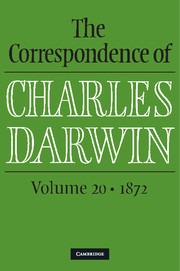
-
Select format
-
- Publisher:
- Cambridge University Press
- Publication date:
- July 2018
- June 2013
- ISBN:
- 9781139815000
- 9781107038448
- Dimensions:
- (234 x 156 mm)
- Weight & Pages:
- 1.48kg, 904 Pages
- Dimensions:
- Weight & Pages:
- Subjects:
- Life Sciences, Evolutionary Biology, Darwin
You may already have access via personal or institutional login- Subjects:
- Life Sciences, Evolutionary Biology, Darwin
Book description
This volume is part of the definitive edition of letters written by and to Charles Darwin, the most celebrated naturalist of the nineteenth century. Notes and appendixes put these fascinating and wide-ranging letters in context, making the letters accessible to both scholars and general readers. Darwin depended on correspondence to collect data from all over the world and to discuss his emerging ideas with scientific colleagues, many of whom he never met in person. The letters are published chronologically: volume 20 includes letters from 1872, the year in which The Expression of the Emotions in Man and Animals was published, making ground-breaking use of photography. Also in this year, the sixth and final edition of On the Origin of Species was published and Darwin resumed his work on carnivorous plants and plant movement, finding unexpected similarities between the plant and animal kingdoms.
Reviews
'A mine of information.'
Source: The Times Higher Education Supplement
'This volume is packed with interesting information. How much I look forward to the volumes that take us through the next ten years, to the end in 1882. I used to think, forty years ago, when I and other Darwin scholars were rampaging through the vast holdings in the University Library at Cambridge, that we would have used up all of the good material and left little for the next generation. Now I see how wrong I was. We have a good basic idea of Darwin the man and scientist. How much there is still to learn about the influences and implications. Rightly, the Darwin correspondence will give work for years to come.'
Michael Ruse Source: The Quarterly Review of Biology
Review of volumes 19 and 20:'The editing and organization of these volumes is, as always, superb; the Darwin Correspondence really does set the standard against which all comparable projects have to be measured. In addition to a wonderfully erudite editorial apparatus (the footnotes alone contain a wealth of invaluable information), all the surviving letters Darwin received are published … as well as by dates, topics and so on … the importance and usefulness of these volumes go well beyond the world of Darwin, or even studies of the many forms of nineteenth-century evolutionism. No Victorianist should be without them.'
Jim Endersby Source: British Journal for the History of Science
Review of volumes 20 and 21:'Each volume contains an introduction, a chronology, a bibliography, a biographical register, and a wealth of footnotes, all of which help the reader to navigate the text. There is also a variety ofsupplementary material, including well-chosen illustrations.'
Michael Ghiselin Source: Isis
Contents
Metrics
Full text views
Full text views help Loading metrics...
Loading metrics...
* Views captured on Cambridge Core between #date#. This data will be updated every 24 hours.
Usage data cannot currently be displayed.
Accessibility standard: Unknown
Why this information is here
This section outlines the accessibility features of this content - including support for screen readers, full keyboard navigation and high-contrast display options. This may not be relevant for you.
Accessibility Information
Accessibility compliance for the PDF of this book is currently unknown and may be updated in the future.


